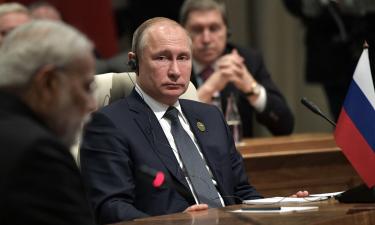Spain to honor Civil War victims
Spanish lawmakers agreed to honor the victims of Civil War and rightwing dictatorship – a bold step to revalue country's darkest chapter.
Some details remain to be worked out and two parties are still opposed, but the accord breaks months of deadlock in negotiations on one of Spain's most sensitive issues, said Diego Lopez Garrido, a spokesman for the ruling Socialists.
It now goes to two committees before debate in the full Parliament.
An estimated half a million people died in the Spanish Civil War of 1936-1939, triggered when Nationalist forces under Gen. Francisco Franco led a military uprising that ousted an elected, leftist Republican government.
During the war, pro-Franco forces carried out summary executions of civilians accused of supporting the Republican side, and after the conflict many more were convicted and jailed after summary trials. Republican forces also carried out wartime atrocities in what is widely considered modern Spain's darkest moment.
Democracy was restored in 1978, three years after Franco's death. But this transition included a tacit agreement among parties to put the war behind them in the interest of rebuilding. No war-crimes trials were ever held.
Many in Spain say the legacy of the war is one of modern Spain's greatest pieces of unfinished business.
Socialist Prime Minister Jose Luis Rodriguez Zapatero has made coming to grips with Spain's wartime past one of the main goals of his term in office, which began in 2004. General elections are scheduled for March of next year.
The bill is called the Historic Memory Law and owes much of its impetus to a non-governmental organization which since the mid-1990s has been exhuming bodies of victims of the Franco regime from mass graves as part of a broader campaign seeking reparations for people who suffered repression under Franco.
The legislation would be an unprecedented, formal acknowledgement of that suffering.
Socialists officials would not disclose the details of the accord reached Monday because it is still subject to more closed-door negotiations. But they said a final bill will presumably include some kind of monetary reparation, although just a small amount meant to be purely symbolic.
"We think we are faced with an important moment," Lopez Garrido said Monday.
The goal of the bill is to give formal recognition to "people who were hurt or killed, or their relatives, or whose property was damaged as a result of the historic tragedy" of the war.
He said the conflict caused suffering on both sides, "for all Spanish men and women."
The main conservative opposition Popular Party opposes the bill on grounds it is divisive, saying it is better not to stir up memories of the war.
The agreement was reached among the ruling socialists and a half-dozen smaller, regional-based parties and United Left.
Although the government wants to get those opposing the bill on board, the deal means the measure will likely have enough support to push it through Parliament.
A leftist Catalan party called Republican Left opposes it but from the other end of the spectrum. The bill calls Franco-era political trials illegitimate, but does not repeal them outright as this party wants.
Lopez Garrido said the bill is inspired by the "spirit of concord" that marked the transition.
"It does not go against anyone. It does not seek to dig in any kind of wound or stir up memories of any kind. Not at all," he said.
Subscribe to Pravda.Ru Telegram channel, Facebook, RSS!





